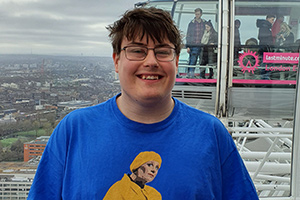Press Ganged - An interview with Steven Moffat
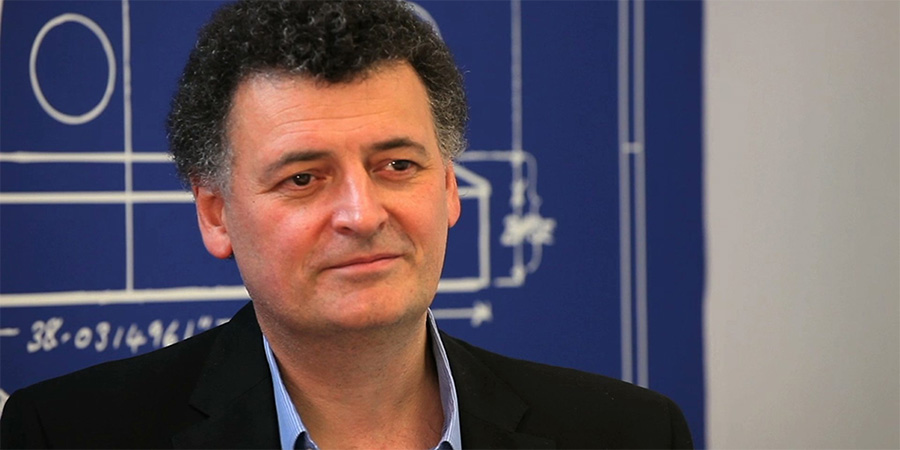
Since being at the helm of perhaps the most popular Doctor Who period yet, Steven Moffat shows no signs of slowing down. Ahead of his long-awaited return to comedy later this year with debut play The Unfriend, we chat to the Press Gang, Joking Apart and Coupling writer about sitcom success, crafting comedy, American remakes and his plans for the future.
When you were trying to break into the industry, were there any comedy writers you particularly admired?
Well, there's quite a few, but one whom I suppose should haunt any comedy writer with a sense of their own resounding inadequacy would be [American playwright] Neil Simon; any given page of his comedy is worth any script I've ever written.
Also, John Cleese in his Fawlty Towers mode, with Connie Booth. I'm not sure a better set of scripts have ever been written to this day, it's simply extraordinary.
Always, as ever, Richard Curtis. Again, to this day, no diminished powers at all. His grasp of making something funny without ever seeming to have striven to make it funny, just to let it be funny in a relaxed way. I always think the kind of comedy I write you can see the veins bulging at the ballpoint, it's worked for. Richard has a magical way of - you're laughing and smiling before you even know why. I'm sure there are lots of writers that I've forgotten about.
You spent a lot of your career working with Fawlty Towers director Bob Spiers. Did you learn a lot from him and did his involvement lend a certain prestige to your shows?
Well, yes to both of those, very much so. He was deservedly and rightly an absolute star in the comedy directing firmament. At any kind of comedy, his understanding and his grasp of how it worked visually and how it worked in action; his understanding just of the mechanics of a joke, which is not something that I ever notice until it's absent. If you're occasionally dealing with a director or, not often in my case, but an actor or producer or an editor who doesn't understand the mechanics of a joke, you almost don't know where to start, you know - 'I don't get how this works'. It's like you don't notice the air until it's withdrawn from the room. I learned from him constantly. Certainly, he was quite a grumpy man... I loved Bob but he was a grumpy man!
He came in on Episode 3 of Press Gang and I had a shaky start for the first two. I hadn't enjoyed it much and I'd been suffering a bit because I didn't think it got to the screen the way it should. I was asking for reshoots - God, I was an arrogant young man! Twenty six! I'm more humble when I ask for a reshoot now than I was when I was twenty six. But yes, I didn't think the script had been delivered correctly - not not stuck to but delivered correctly... a big distinction there.
Bob knew that I had suffered a bit so he sat me down and took me through everything he was doing whilst he was shooting. He wouldn't let me off the set, I remember that. The first director hadn't wanted me around but Bob said "No, I want you here all the time, in fact I want you here", he warned me, "more than you will want to be here".
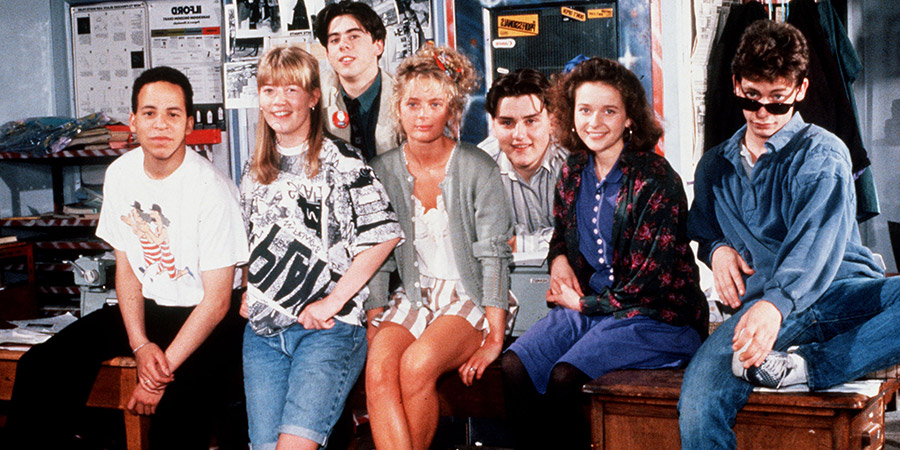
I remember a sequence where Lynda and Kenny I think, I can't remember all the details correctly, were having an argument and Kenny was contemplating at that point leaving the Junior Gazette, but Lynda didn't know that. The way I'd written it in the script was he kept glancing at the door and that was supposed to indicate that he wanted to leave. Bob sat me down and said "Look, what you're asking me to do is cut to a shot of a door. It's boring. Nobody cuts to a shot of a door. It could be any door, how do you know it's not the wall or the light switch? He could be worried about someone coming in. But I know what you mean so always write that stuff down". So, what he did instead, was a slow tracking shot that brought the coat stand into the foreground. When something arrives in the foreground like that you pay attention to it, because it's not supposed to be there. Kenny's coat, well established earlier in the episode, was hanging so he got the subliminal impression - he was going to go, right? That sort of detail he would always go over with me so thoroughly.
He was always very appreciative, if I ever wrote down what I thought the camera should be doing he said "absolutely, please always do that". Some of the time he'd do that, other times he'd go "I know what you mean, but I've got a better idea. I know what you are trying to convey but I can improve on that". And that's really important, writers should always try and write down everything.
A talented director will say "I know what you mean, I know what you're after and I will give it to you, but not necessarily in the way you are asking me to". So yes, he was brilliant, his understanding on the mechanics of a joke was, well again you only notice it in its absence. You tear your hair out and then it's "Oh yes, it's at the back of that shot or the foreground". So yes, he was a massive help. Once he'd got me up on my feet and sorted out and working hard and confident, he was just as grumpy to me as he was to everybody else, but he did give me a couple of months where he was as kind and as helpful as a director could be. I loved Bob, brilliant, brilliant man who deserved the career he had.
Joking Apart, your 1990s sitcom about a man going through a divorce, is very farcical in nature. You use a lot of what you refer to as 'techno farce', is that a technique that works particularly well for comedy?
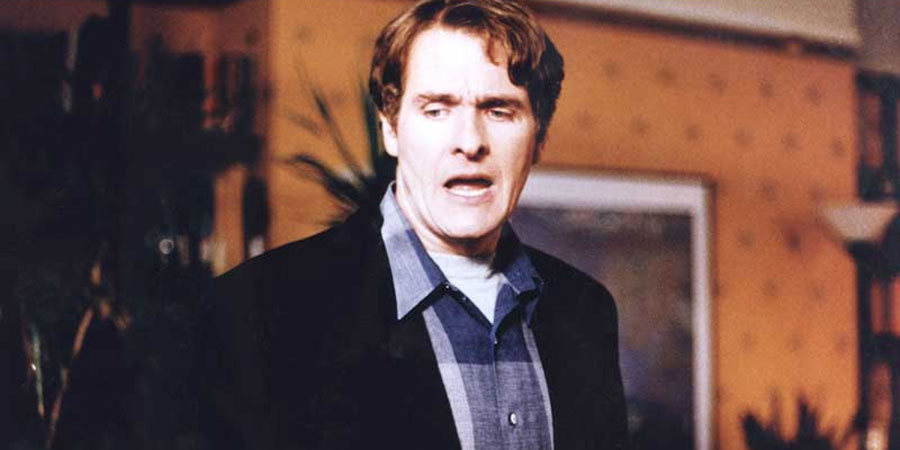
Yes, and I don't think there's anything dated about farce. Farce is great, it's the fundamental heartbeat of comedy. People will always love farce; I don't think that aspect has particularly dated. Even showing the mighty Fawlty Towers to my sons, they take a moment to get past "is that supposed to be a hotel?", "Why is the lobby so huge, why do they go upstairs and come down again?"... Then, of course, its sublime brilliance takes over. If you're minus the sublime brilliance it won't work quite as well.
As the central character Mark is modelled so closely on yourself, did that inhibit you in where you could go with the show?
Well, at the beginning, it probably helped. When I wrote the first one, I was close to the events; close to the trauma and the sadness of it. That doesn't mean it's a particularly truthful piece of television, I don't think it is. I think if my ex-wife were to review it she'd say, "please don't do that". "So the entire divorce was about you, and you being funny? It wasn't just that I met someone else and you're a dick?", you know, "Because you've got such a good sense of humour". So I think there's a big streak of narcissism in that.
It's a good show, but a big streak of narcissism in it; "I am at the centre of everything and nobody can make a decision except me. I am at the centre of the universe" or, as it turns out, this sitcom.
But when I came back to it I was young, in my late twenties - I was over it by then, I was fine! I had a show where the format fell apart at the end of Episode 1. The format was a marriage falls apart. Well yeah - guess what? Then you don't have to see each other. That's not much of a precinct for a TV show, a plundered marriage, and indeed two friends that you don't like especially. What kind of show did I have? So from that point on, I was just trying to write funny. Using flashbacks and so forth but I was just trying to write funny material. Even more so when we got to Series 2. "Oh dear God Mark, you are still wittering on about this bloody divorce, will you shut up! You didn't even have kids, it doesn't count!"
I think it's a good show, I think it's an odd show and I think it's a great mercy that there wasn't a Series 3 because there is no Series 3! What is the story? Mark continues not to be with Becky, his co-lead that for reasons of narrative he can never be with. It's not an idea for a series, but I think my memory is, and I haven't looked at it for years, it veers from extremely funny to a little bit forced was my feeling about it. But in terms of its peaks, its big, funny moments, I thought it was pretty good.
There are frequent inserts of Mark performing stand-up in a comedy club. You've explained previously that these sequences were supposed to represent his internal monologue but that they didn't quite work. Would you write them differently if you made it again, or not use them at all?
I'm not as stubborn now. When you're that young you think you're right all the time, you can't even contemplate the possibility that other people might be right. People told me at the time "that doesn't work". I don't do that sort of thing anymore. People tell me "it doesn't work" and I get rid of it, that's the correct way to be.
Now, I don't think the stand-up bits worked. I think they're confusing and eventually by the second series they're just used to introduce the subject. I know that the vastly superior Seinfeld had the same problem, and that was brilliant of course, absolutely brilliant. At the same time, eventually they just shove it to the side because that's not a thing. You don't cut to a shot of the damn narrator, don't be silly.
Mark of course was played by the brilliant national treasure Robert Bathurst, who always says to me "Let's just reshoot it"... rewrite and reshoot it, so we'd replace the sequences with him as the stand-up comedian with him now. "I'm a TV comedy writer who once wrote a sitcom about my divorce, and here's how it turned out, I'm played by some young bastard" and we represent it, repackage it that way. It's slightly four by three, three wall set becomes period detail and it looks like we did it on purpose and magically found someone younger to play him. So I think that would actually be quite good. If anybody at the BBC wants me to do that, I'll do it.
It would be quite the callback, twenty-five or however many years later we are.
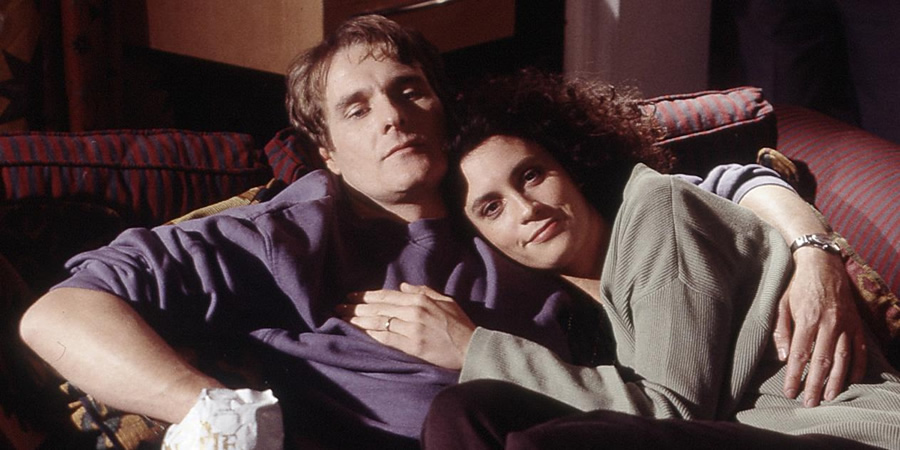
Exactly. And of course because he's Robert Bathurst now, he wasn't Robert Bathurst then. He's a very funny man.
You said in the DVD commentaries that Episode 5 of Series 1 is not only your favourite episode, but the best of the whole show. What is it about that episode in particular that makes it stand out?
God, I can't even remember what I said in the commentaries! I remember the plot unfolded with great ease. It does seem to be that if Episode 1 plus Episode 2 are Chapter 1, that was Chapter 2. He turns out not to be the victim but to be just as awful and selfish as everybody else. And we're done, that's kind of the end of the story. I'm not sure where you can go after that. It's also kind of truthful.
If you, as I have considered, adapt it as a stage play, Episodes 1 and 2 are act one; act two is Episode 5.
Famously, particularly true of men but probably true of women too, once you get chucked out of a relationship, in your view unreasonably and unfairly, men behave very badly because you think you've been given a licence. Victim licence is one of the worst things in the world; 'I am a victim therefore I can do terrible things to people'...
Is the stage play something you think you might get round to, if we're ever allowed back into theatres?
If we're allowed outside our homes... come on vaccine, please!... I wouldn't be against it; I don't know if there would be any interest in it. There's obviously already a play called Joking Apart [written by Alan Ayckbourn in 1978].
I think it would work, I think you could do that. Treating it essentially as a new piece. I was going to have a stage play in 2020 [The Unfriend, now expected to run at Chichester Festival Theatre in 2021, dates TBC], obviously we got chased out of theatres into our bedrooms. So maybe.
Somebody's actually already done it as a play, they did some Coupling too. I'd be quite interested in that only because, in common with other stuff I've done, my God those studio nights were amazing. I've been to a lot of studio nights, a lot of studio nights; sitcoms I wrote and sitcoms I didn't write. In front of an audience it took off like anything. Never quite managed to crunch down into the TV screen in the same way. But as a night at the theatre, Joking Apart, my God we had some amazing laughs.
After you won the Bronze Montreux award for Episode 1 of Series 2, were there any talks about a third series and did you sit down and think seriously about any potential plots?
Yes, there was talk about Series 3. But I saw the writing on the wall, as Series 2 was continually delayed, I think it was delayed about five times. So, it was two years after a not very successful debut, it had its less successful follow up. It was not beloved at the BBC although I think they quite liked it. But they were very kind to me. Obviously Robert Bathurst went onto greater things.
I see young writers make this mistake all the time by the way, "I just want a third season because I want the phone call that says, 'we want another one'". Victory! And, what? Because I can tell you, I have a lot of experience in television and keeping TV shows alive, I don't know what the hell you do with Series 3 of Joking Apart. Get them back together? That's just like Kirk deciding not to take charge of the Enterprise, it would just undo the bloody series.
There's a certain financial imperative. A conversation I had with Russell T Davies a while back, I said "You really want to do the second series of anything ever again? Do something new!" Maybe we needed to do that [indicating making money] a bit more.
I think it's quite difficult to imagine how you could contrive for Mark, Becky, Robert and Tracy, who really don't like each other very much, to keep meeting up week after week.
There's no format. Four people with increasingly diminishing reason to have anything to do with each other and yet they don't seem to have any other friends, or any other life except each other. What would the end be? You discover it's actually a lab experiment and they're only allowed to know each other? And Trevor, of course.
Have you ever thought about writing a reunion special, or just getting the cast back together?
I'd love to get the cast back together, because we had such fun on that show. We're all ancient now of course - sorry cast - but God we had a laugh, I love them to bits. But the end of Series 2, if I'm being honest, I was scrabbling to work out what the hell was going on. What do we do now? Episode 5 of the first series I think is the natural ending of the show. There are some good episodes after that, I think there are some very funny episodes. Particularly, why it needs to be around a divorce gets increasingly lost. You're a handsome young man Mark, why don't you date someone else and shut up. I wasn't a handsome young man but even I was doing that and I wasn't as tall or blonde as my Aryan counterpart in the fictional world!
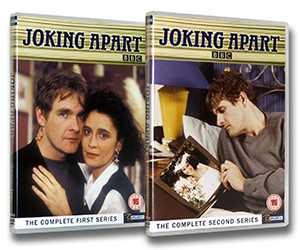
How did you feel when you heard that the DVDs were being released by a fan who funded it out of his own pocket? To know you wrote something that meant that much to somebody?
Well, I was initially just worried about all his money! To sell to all seven people online. It's not one of those shows that ever particularly cut through. We didn't cut through, it sank to the bottom of the sea in a chest buried under a shipwreck, it really didn't cut through. A small number of people like it and I think it's pretty good if you can look at it through the filter of the years. Always very important and easy to do for a Doctor Who fan!
But I was delighted, we'd never seen the episodes look so good. He really tidied them up, they looked way worse on television! They looked beautiful, he really zhuzhed them up and I was touched and moved and apprehensive. Certainly, I was happy for people to see it again and, as ever with Joking Apart, it got stellar reviews. You couldn't really complain about Joking Apart's reviews, they were through the roof. But it never translated into a large number of people... which is on the tombstones of a large number of shows I've written.
Chalk, it is fair to say, had a less than positive reception. But it had an amazing response from the studio audience, more so than a lot of shows, and it was looking as though it would be a smash hit...
Yes, so that was fun... Well let's see, I don't know how you break that one down. It's absolutely true about the studio audience reaction, the biggest studio audience reaction I've ever heard was on Chalk. But viewers absolutely hated it. And I don't just mean those unfair, miserable critics. Something like Mrs Brown's Boys might get trashed by the critics but people love it. It's a good show, clearly a first-rate show, snobby critics don't like it. That's not the case with Chalk, real people you met in the street didn't like it. My mum told people I was ill when I wrote it!

We went from thinking we were going to encounter glory to realising that we were, for a reasonable amount of time, the byword for 'sitcom disaster'. For quite a long time. And, just at the time we were starting to realise the depths of the misery into which we had descended, we had to make Series 2. Just about a day too late for the BBC to say 'fuck that', which they would have done if they had enough time. So we had to plod on making Series 2 of the most despised show on television and then watch it go out in the graveyard slot.
I still managed to lower the ratings of that graveyard slot; the graveyard slot usually did better than when Chalk was in it! So it wasn't great. It's an interesting thing, I don't really know what to say about it. It's got some very good performers in it -
I thought David Bamber was particularly good.
Of course, he is consistently superb.
I don't know what goes wrong. I think you take it back, as you always do, to the scripts. There's no point to it. You always have to be able to, no matter how trivial the answer is, you have to be able to answer the question 'what is this show about?'. It's about 'teachers aren't very nice' - what? Really stupid. That's not interesting. Why is Eric Slatt a bad deputy?
I was to some degree, ill-advisedly, aping Fawlty Towers, the best sitcom ever made. Amusingly enough, Chalk is considered by many to be the worst. The thing is, I know why Basil Fawlty is bad at running a hotel. I think quite a lot of the time in the unworthiest parts of my brain I kind of sympathise with him. I'm with him. I would beat up that car. I'd be a snob; I'd do all those things. That's the genius of Alan Partridge too you know, 'I'm a dickhead'- I'm exactly like that. That's what you think, that's why it's funny, because it lives inside your head. You absolutely know why Basil Fawlty is the way he is and he has a life outside of it somehow. Especially watching it now, you realise he's a handsome man with a very beautiful wife - why is he so upset? That's a sexy couple by any standards. It's sublime.
The best joke in Chalk isn't actually in Chalk. It was an absolutely withering, destructive, soul-clenchingly bad review - even among the reviews of Chalk this was bad. It did the great kindness of comparing my work to John Cleese's, actually beat for beat why I was so terrible, which was awful. But it had the best headline ever for a bad review - Chalk and Cleese. That's superb, funnier than anything I wrote in Chalk.
How do you deal with reviews like that, especially after Press Gang and Joking Apart were received so well?
Like a man, I wept.
I was really thrown, in all seriousness. I was demoralised; frightened, thinking that the golden voyage I was having up until that point was over. Press Gang and Joking Apart weren't massive ratings hits but they made a reasonable impact and I was regarded as one of the coming writers. That was good enough for me - "I will do my next show and people will think it's marvellous". Oh, they did not! So when you've had two shows that aren't successes and a third one that's even less successful, it's not great news. I just got into the habit of trying to avoid the subject.

At that point I'd just got together with Sue [producer Sue Vertue], we'd just started dating. We then got married. She'd done things like The Vicar Of Dibley and Mr Bean while I'd just done Chalk so she thought she'd marry the village idiot.
There was a meeting at the BBC that talked about sitcom success and sitcom failure and there were three titles on the board - Vicar Of Dibley produced by my wife, Men Behaving Badly produced by Beryl Vertue [Moffat's mother-in-law], then a big line and Chalk underneath, Chalk being the reproving example of how badly it can go wrong.
I did not deal with it well. I think it was good for me because I had an arrogance at the beginning, as young people often do, which never came back. It never returned; arrogance is pretty useless. It is not a good thing for a writer to be. I was never arrogant again. I constantly think, I can't stop myself thinking 'this could be hated'. And if something is hated I think 'ah, there it is again'. If something is loved I don't even feel proud, I just go "phew, got away with that one!". But that's probably necessary, you probably have to get to that place, I don't think that's a bad place to get to. What fun!
How long after Chalk was it before you began working on Coupling?
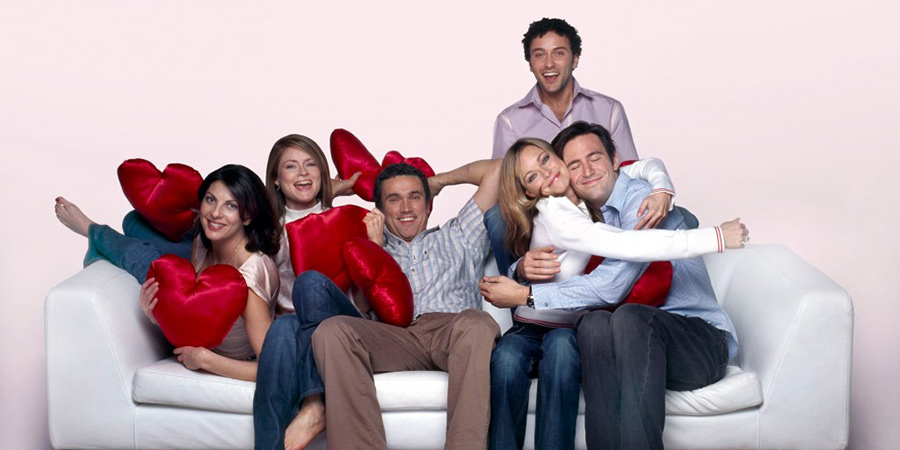
It's not that long after. I think of it as a different lifetime but it really isn't that long after. Sue and I got together in '96, I think Chalk was '97 and by 1999 we're doing a staged reading of Coupling for the channel controller of BBC Two and I'm getting underway with writing the show. It's not a huge gap but it feels like a different world to me.
It was a perfectly respectable success, Coupling. I was very relieved when that came along that people didn't think I was a complete moron. A partial moron but not a complete moron.
How much of a logistical nightmare was it to make the celebrated split-screen episode to launch Series 3?
Horrible, absolutely horrible. Because we did it live, so beyond trimming it, both shots were side by side so you couldn't really cut. It was a very short studio shoot because we couldn't keep retaking it, there would be no point. We were in the bar quite early! But yes, it was a terrifying logistical nightmare.
Whether it was worth it in the end I don't know. I think it probably stifled the comedy a bit because you had so much to think about. The convention, it's daring and ambitious and therefore got nothing but splendid reviews from everybody, even the people who normally hated us. Then when Episode 2 came along the same people who had just given us glowing reviews said "thank God it's not in split screen this week!". Everyone sort of felt "that's not fair!", you know, they've pushed the boat out, they've worked really hard so we'll say nice things about it but I hope it's back to normal next week!
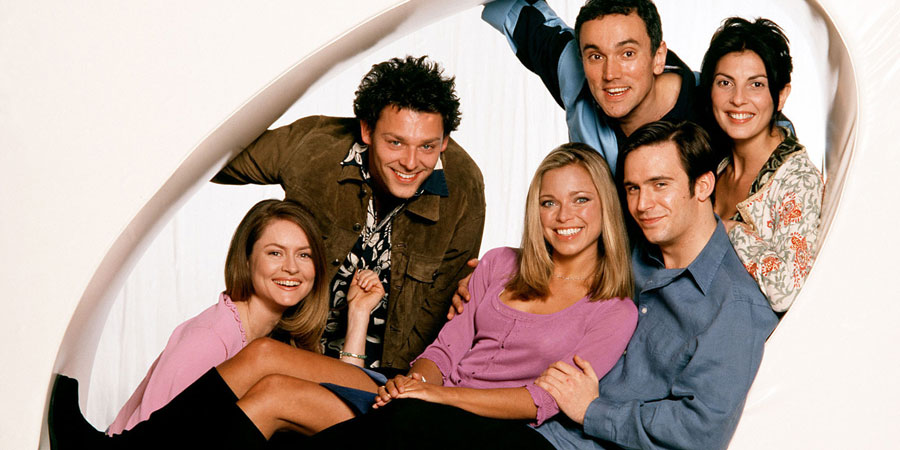
You also wrote an episode where half the dialogue was in Hebrew. It seems you were trying to challenge yourself and the audience with each subsequent series; was that the case?
Why not? I think that one works very well, it was a good experiment and I'm proud of that one, though it didn't go down well on the studio night. Unlike any given episode of Chalk, the audience were dying of boredom and fleeing. I remember watching yet another bunch of the audience slipping out the door. I just put out half a show in Hebrew - why did I do that? We moved it in the run of transmission from four to five because we thought maybe it was our turkey.
Of course it was the episode that put us on the map and when you put it all together and you see it work, it becomes I think a very polished bit of comedy. If you pull off that kind of cleverness, taking a risk... and people don't talk about this much: taking a risk. If you're a risk-taking writer you are going to fail quite often. You might even fail most of the time if you take risks, that's what risk means - a thing that has a lower than normal chance of succeeding. If you're succeeding all the time you're not taking risks. On the other hand, why take risks? When I'm sitting on a plane I don't want the pilot to come on the intercom and say "well, I'm not one of those conventional pilots, I like to risk things". Are you? Well I don't want to be on your fucking plane then!
An American remake of Coupling was cancelled after only a few episodes. How involved were you with it and what was it about the show that failed to translate?
Oh God it's a hard one to answer. At the time I blamed it all on network interference but I think the fundamental problem was commissioning it at all.
Why did they commission it? Because they were about to lose Friends and the poster looked similar and it had the same amount of people in it. Coupling was an ostentatiously BBC Two sitcom. They tried to move it to BBC One and I refused. It will die a death on BBC One, it's a BBC Two sitcom. So instead of BBC One we'll go to... NBC? That's not going to work!
I think it's fine to market our show as the British version of Friends. Even though I don't really think it is, it's a perfectly good way of thinking of it. We had already pushed ourselves in rather a glam direction with Coupling, as you know, beautiful cast. The American instinct is to make any British show more beautiful. They made their cast more beautiful - there isn't a lot of headroom over Gina Bellman, Sarah Alexander and Jack Davenport! These are head-turning people. They don't, or on that show they did not, get farce at all. Farce is all set up. You've got to set up and get the big woofer. Don't rush to the punchline. Let it build. But mainly, conceptually it was the wrong show for the wrong slot.
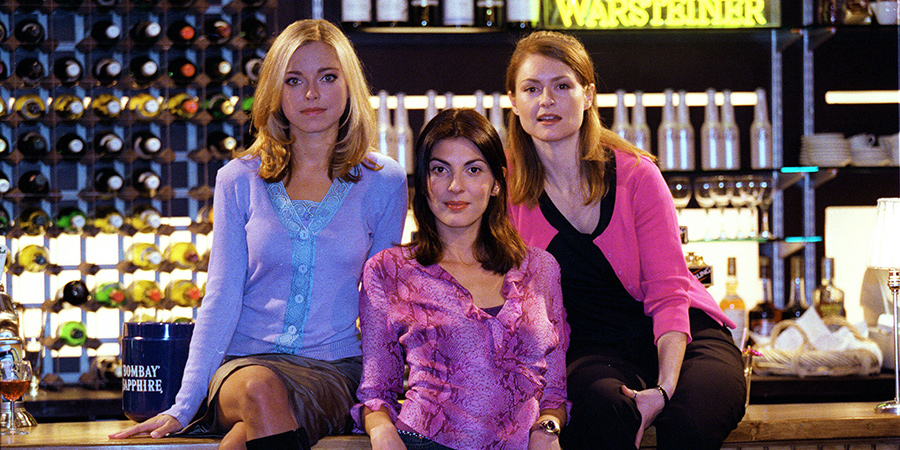
But I have to say in defence of the team on that, some amazingly talented people. Phoef Sutton, who I'm still friends with to this day, was the showrunner. A brilliant writer. He wrote some of the best Cheers ever, he's written some great novels. A terrific writer, you couldn't get better. The cast have all done really well outside of my attempt to derail their lives. You could not fault them; they were all well cast.
The other thing was that, possibly, they stuck too close to my scripts. I read a couple of things that you never saw, which were their original scripts and they were really good. I remember reading them and thinking "Oh that's good. That's their show. That's not our show, that's their show and it's written to their cast and it's really, really good". In fairness I don't think it ever quite worked the way it needed to.
I remember seeing their first cut of Episode 3, which was very closely patterned after our Episode 3 and thinking "Oh that's very good". As a matter of fact, they came up with a gag, a better punchline to a situation that I'd thought of and I was going "Damn, that's an improvement!". Then I saw the network cut and I have to say that was a disaster.
The final big thing to say about that is most sitcoms fail, how about that? Whether they come from a different source or not, most of the time the magic doesn't happen. Most of the time, you don't need to especially say "Why was that one a failure?". I think the mistake was it was commissioned on the basis of the poster not the basis of the project.
Will you ever write a new sitcom?
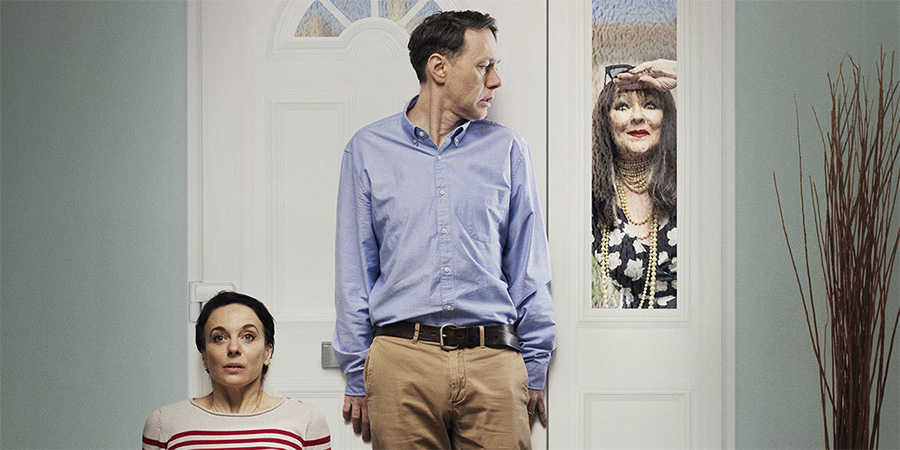
Well, I have just written this comedy play [The Unfriend is set to star Amanda Abbington, Reece Shearsmith and Frances Barber]. That certainly reminded me why I like writing comedy, I'd like to write more comedy.
It's got to be said that I became a much more successful writer when I stopped writing comedy, so maybe there's a hint there! But I'm not against it. I worry that my style of comedy, which I have no particular inclination to depart from, farce, might seem a bit old fashioned now, I think there might be a problem with that. It fits well on a stage, maybe not so well on television. I'm certainly not against the idea.
What I've tended to find is that for all the endless, endless words written about Sherlock, all the unending screams about Sherlock, I don't think anyone has ever mentioned, not one person, that it's a comedy. Watch it, it's a joke a minute. I always think A Scandal In Belgravia, my best ever script, as being very melancholic and sad, but you watch it and it's boom, boom.
Because Mark [Sherlock co-writer Mark Gatiss] and I write comedy, it's a comedy about a detective and everyone wants to focus on everything else. I like that kind of comedy, that kind of disguise comedy, very funny. If you watch it with a big crowd, Sherlock gets the number of laughs you would expect from a high functioning comedy.
Russell and I were interviewing each other for Doctor Who Magazine recently and in the process of doing that we suddenly noticed that we made Doctor Who a lot funnier than it used to be. You think of old Doctor Who, it's not very funny. Even Tom Baker takes it mostly seriously. Why did we go so funny?
The modern version of Doctor Who, I think one of its big successes is actually that it's a funny show. If you don't understand the plot - nobody does! If you don't really care about the monsters, nobody over the age of twelve does. If you don't care about any of that, you're there for some first-class gags delivered by some first-class people. There's a lot of comedy in Doctor Who and, from me, that's paying a huge compliment and is not meant to be insulting, though some people even now will be contemplating an inflammatory blog. It is not knocking it, Doctor Who is a funny show and The Doctor is a funny character. Any character played consecutively by Peter Capaldi and Jodie Whittaker is a funny character.
There's definitely something about comedy writers moving into drama. Terry Nation went from writing for Tony Hancock to creating the Daleks. What is it about writing comedy that makes the jump to writing drama work?
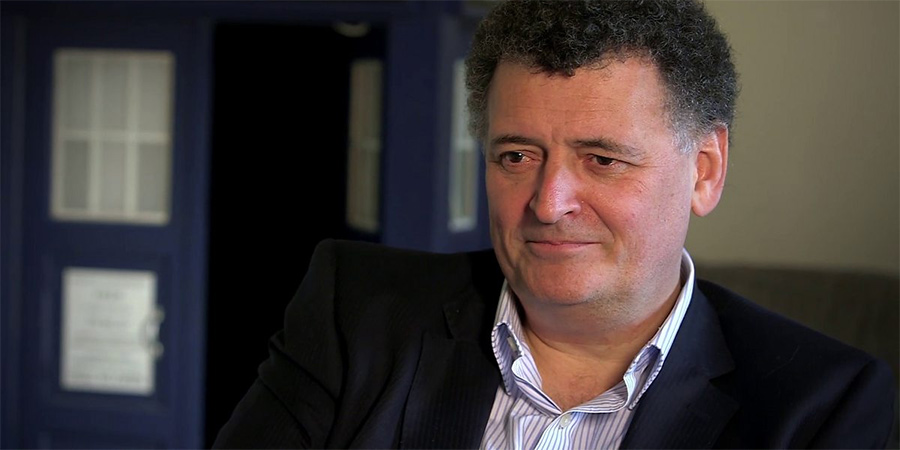
Comedy is harder. Everyone says it, but nobody ever listens. Nobody ever actually takes that on board. Every actor says it, every director says it, every writer and producer say it. Comedy is harder because you can tell instantly. Never mind waiting a week for the reviews, you can tell now whether it works or not: you write something they laugh, that's it. And you are not always going to know, because you're not always going to succeed.
It's a fantastic discipline, writing comedy, because if I'm writing a scene in one of my notional dramas I'll always be thinking - I was doing it this morning on a script - "I've got half a page here - there's nothing on it". There's nothing on this page except people telling each other bits of plot. There has to be something you can put on YouTube, there has to be a gag. Extended definition of gag, a really interesting bit, could be sad, could be a fright, it could be a twist, but something has got to happen to justify the amount of tree you've wasted printing out this script.
Are you able to sit back and enjoy watching a show, or is the professional writer's brain always ticking away?
I think the writer's brain will mostly tick away when it's not working. I'm very susceptible to good television. I don't want to think it's made up if it's good. When something is good you're not thinking about the writer's room or boring conversations with the writer or director or producer. You're just thinking 'this is real, this is actually happening right now'. And then particularly when something could be good but isn't quite doing it - I've written many shows like that - you start thinking 'When went wrong?'.
Quite often I think with shows 'This should work, but I'm not buying it and I don't know why'. It's well shot, it's well made, it's well played - I don't care. Why is that? I rarely come up with an answer. I think that about my own stuff, what's wrong with that, why do I just want to go and make a coffee?
All of the sitcoms you've written have been filmed in front of a studio audience. Was that a conscious decision when you were writing them?
Yes, this is a long time ago as you've probably worked out. I was just fascinated. When I was doing Press Gang I kept asking people "How do you do it?", "How does it work?", "Where are the cameras?", "How can the sitcom audience see over the cameras?", "What happens if something goes wrong?". The most tedious possible answers of course: "we do it again if it goes wrong", "you can't see the set very well because the cameras are in the way so you watch the screens", and all that.
So I was consciously, all three times, writing a sitcom. It's weird, the kind of shows I wrote you wouldn't make that way now I don't think. Generally speaking the reaction to Coupling was very positive, but people would always talk about "Oh, they dubbed on canned laughter".
None. Absolutely unmuted laughter, that's a bloody audience... and, actually, why are you saying that? In the end, it got to that uneasy point where I do not expect this kind of show to be performed in front of an audience.
If you're doing Mrs Brown's Boys or Miranda, one of these big showy shows, you are deliberately engaging with that audience whereas we had a bunch of drama-credentialled actors making eye contact with each other and it seemed odd that there was a noise coming. We only ever once on Coupling made it to the dress rehearsal. We mostly just went in [to the recording].
One night, I think it was for Nightlines in Series 4, we actually did the whole show looking the way it should, in costume and properly lit before the audience came in. I thought 'actually that kind of works, that's better'. It was the first time I saw what Coupling would have been in an alternate universe where you don't need an audience. You decide for yourself where the laughs are. But I am very pleased with Coupling.
You're writing a thriller called Inside Man for the BBC. Is that still on schedule or has it been disrupted by the world ending?
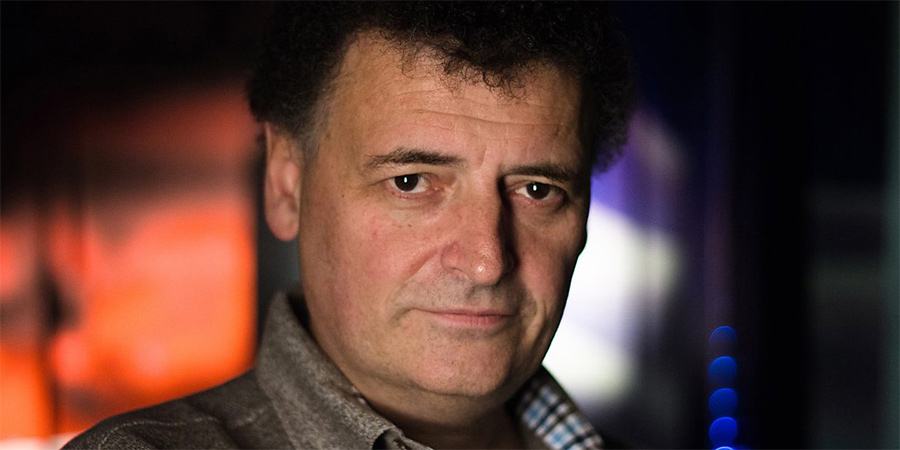
Well it did get disrupted by the world ending. Wasn't the world ending much more fun when I wrote it? Yes, it is on track, it should have been made by now but like a lot of things we're going to make it the same time a year later.
For some reason I've found lockdown, which should be ideal for a writer, absolutely paralysing. I haven't written very much at all, I just couldn't. It was not good. I remember saying to Mark "Why can't I write, I'm stuck at my desk all day?". Mark said "There might be a difference, Steven, between a global emergency and a sabbatical".
That's glorious, that's going in one of your scripts one day isn't it!
Well, I think it has to go in one of his! So Inside Man is on track, I've written three of the four and I'm about to start the fourth one. We've even got a little bit of casting done and it'll be prepping in I think May, which will be exciting. It's not very funny but there are jokes.
You're also doing The Time Traveller's Wife, is that in a similar state of flux?
Well, it's written. Well, no, I can't really say it's written, I've got a version and I'm still working on it, I'm still toiling away at it to make it right because I love that book very much and I want to make sure that I do it justice and at the same time actually make it a TV show, not just a monolith or a commemoration of a book.
It's different, very different. Like the American version of The Office, unlike the American version of Coupling. It's an inspired new take on the same people. I don't think the original The Office is beatable. It's definitely one of the greatest TV shows ever made. But, my God, they extracted from it everything that went well, which was a lot, and made it a new thing and yet the same thing. So that was brilliant. That's what you want to do. You want to say it's the same thing, but not the same thing. That's a tough consideration.
My favourite of the shows that you've written is Jekyll. You said in an interview once that you had an idea for a second series if the BBC were interested. Do you think you'll ever do anything with that?
Not sure. It feels like a long time ago; it was a long time ago. Jimmy Nesbitt's always going on about it, so I suppose it's not impossible. It's the problem of who makes the sequel to a show that didn't do very well? It was a show that changed its mind about what it was every week so it depends how tolerant you are of that. It wanders madly around the place. Most of the mad places it wandered to were pretty damn fun. Episode 5 was the best one.
I can't let you go without asking a few Doctor Who questions. Is it true you asked One Foot In The Grave writer David Renwick to script an episode of Doctor Who?
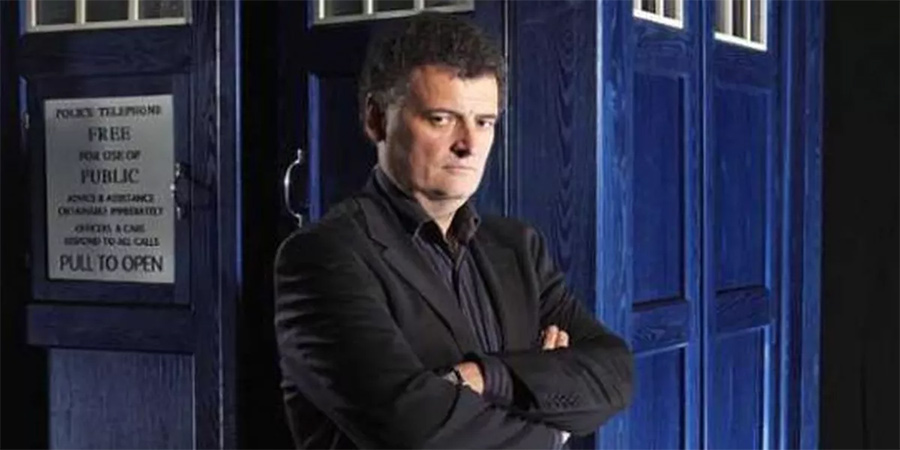
Yes, it is true. And he said he didn't like Doctor Who and he didn't want to do it. Dead to me...
He's not dead to me! I love David Renwick and I love David Renwick's work. It's one of those occasions where you want to say "just let me in the room for ten minutes because I can persuade you that this is your show. A lot of people don't think it's their show, Doctor Who, but if you just let me in the room for ten minutes I'll explain to you why it is". But he was just 'No'.
I was watching The Curse Of Fatal Death recently, which was the first Doctor Who you wrote for television. When you became showrunner were you ever tempted to use some timey-wimey contrivance to bring Jonathan Pryce back as The Master?
[Laughs] He was great as The Master. He's very much an inspired take on the classic series Master. We were trying to move away from that, although I think Sacha [Sacha Dhawan, who currently plays The Master] in a very clever way has started moving back to it, which I think is smart. But he was very much a take on that. There's quite a few elements of The Curse Of Fatal Death that I came back to, lines of dialogue like "I put a lot of work into the Universe, look after it". So I didn't forget it. I should email Chris [Chris Chibnall, current showrunner] and ask him to do it 'while you're having flashes of Brain Of Morbius, could you just get a frame of The Curse Of Fatal Death in?'
The Unfriend will run later in 2021. Keep an eye on Chichester Festival Theatre for dates.
Help us publish more great content by becoming a BCG Supporter. You'll be backing our mission to champion, celebrate and promote British comedy in all its forms: past, present and future.
We understand times are tough, but if you believe in the power of laughter we'd be honoured to have you join us. Advertising doesn't cover our costs, so every single donation matters and is put to good use. Thank you.
Love comedy? Find out more

